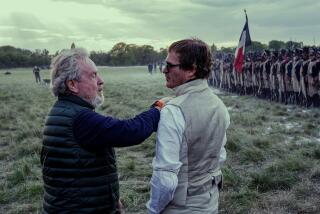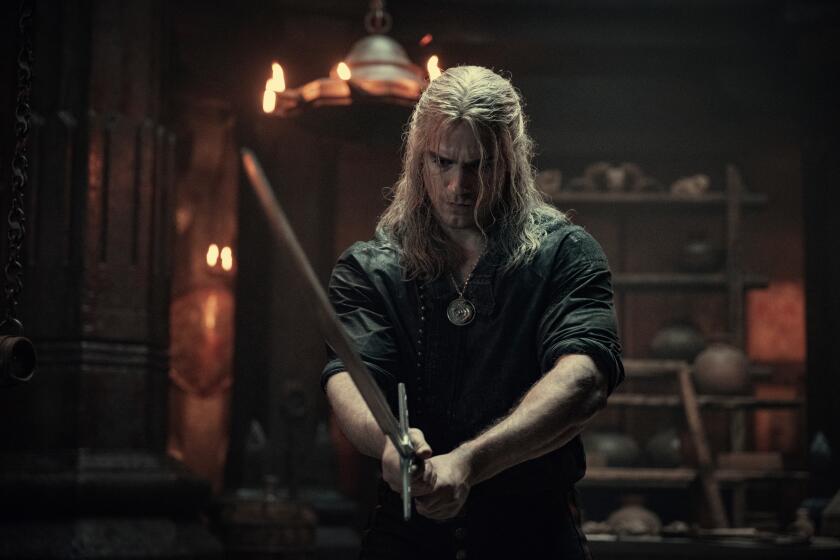Review: A ‘Les Miserables’ that doesn’t sing
You may be interested to know that before “Les Miserables” was a movie based on an international smash pop opera it was a novel by Victor Hugo that gave birth to a host of movies and miniseries (French and American) in which nobody sang. (In the silent versions, no one even talked.)
It’s a safe bet that more people have seen most any one of those than have read the book, or at least the whole book, which is very long – there are speeches in it longer than this whole review – and crazily digressive.
The latest of these non-musical adaptations, a BBC-PBS co-production, arrives Sunday via the PBS series “Masterpiece.” It stars Dominic West as the convict-turned-mayor Jean Valjean (was bad, now good) and David Oyelowo as Javert, the policeman obsessed with putting him back behind bars (so good he’s bad).
Dominic West on the near-erotic bond between Valjean and Javert in ‘Les Miserables’ »
Alongside the main antagonists, we meet fallen sparrow Fantine (Lily Collins, dark and thin in the Anne Hathaway mode); her daughter, Cosette (Mailow Defoy as a child, Ellie Bamber a little older), mistakenly left in the unscrupulous, abusive care of the Thenardiers (Adeel Akhtar and Olivia Colman, Oscar winner); a kindly bishop (Derek Jacobi) who sets Valjean back on the road to humanity; a rich old Royalist (David Bradley, in powdered wig and beauty mark) and his confused grandson, Marius (Josh O’Connor), through whom many story threads will pass; as well as the Thenadiers’ daughter, Eponine (Erin Kellyman), in love with Marius and, to my mind, the best realized character here. It’s an inherently sympathetic part, but Kellyman inhabits it with a tender dignity.
The screenplay is by Andrew Davies, Britain’s dean of literary adaptations; he has had his usually successful way with, among other books you may have once been assigned to read, “War and Peace,” “Daniel Deronda,” “Pride and Prejudice,” “Bleak House,” “Little Dorrit” “Middlemarch,” “Vanity Fair,” “The Way We Live Now,” “Fanny Hill,” “Sense and Sensibility” and “Pride and Prejudice” — the great 1995 miniseries with Jennifer Ehle and Colin Firth.
His six-part “Miserables” hits all the novel’s main narrative points and many minor ones, and adds some fillips of his own. Some are for practical reasons; some are interesting interpretations of the source material; some serve to build out character; and a few completely sacrifice sense or the integrity of a character for the sake of added drama or to introduce an irony. (What I’m saying is, don’t make the series the basis of your book report.)
West brings plenty of intensity to Valjean, though he’s at his best in the brief moments he’s allowed to be relaxed and happy. His rescue of little Cosette from her wicked keepers is an especially rewarding sequence — their meeting, by a spring, shot in shades of fairy tale blue. (Valjean is the good-as-magical godfather to her Cinderella.)
As Javert, Oyelowo matches West for intensity — we are to see them as not entirely dissimilar, I think — but the writing does the actor no favors. Apart from a comment or two on the inherent wickedness of criminal types and the thin line of discipline separating civilization from chaos, we are given little sense of his inner life, so that his eventual choices — I am trying to avoid spoilers here — seem somewhat arbitrary, even ridiculous, and not nearly tragic.
More problematic are Marius and Cosette. Their romance motivates much of the action in the story’s latter half, but O’Connor’s Marius especially lacks weight. Though his part requires some indecision — Hugo devotes several chapters to Marius working up the nerve to talk to Cosette in the Luxembourg Gardens, which comes down to moments on the screen — it’s hard to see what she sees in him, other than he’s the first boy ever to talk to her.
On the page, Hugo’s characters worry over their actions before and afterward, sometimes at great length, but since many of them are solitary figures or keeping secrets, their screen versions have no one to tell their troubles to. And so the actors must rely on an uneasy look, a tight jaw, to get it across. The musical has the advantage here, being mostly soliloquy.
Even more than to the book, this new swing at the story will be held against the 2012 film of the stage show, with its movie-star faces and luxurious production values and ever-roiling emotion. It will have to do something viscerally impressive with the signature Big Scenes of the 1832 Paris revolt, in which protesters hoping to overthrow the monarchy (again) found themselves barricaded in narrow streets facing the guns and cannons of the French army — Team Vive le Revolution versus Team Vive la Roi.
And director Tom Shankland does do a decent job of suggesting spectacle on a limited budget; the barricade scenes are exciting, if somewhat underpopulated (except when the special effects step in), and other set pieces are well-handled, including the opening sequence on the body-strewn Waterloo battlefield, the day after, and social dance scenes, seemingly crucial to any 19th century literary adaptation.
It doesn’t need to actually sing to “sing,” but it doesn’t in any sense. It’s prosaic, with a tendency toward cliché: Characters say things like, “Now stand out of my way,” and “I hate you!” and “On your knees, scum.” It tells the story well enough but rarely gets under the skin of Hugo’s mad book — a kind of spiritual potboiler cum encyclopedia that includes lengthy excursions into history, economics, philosophy, retrospective travel writing and religion. To completely adapt it would be very postmodern indeed, and no one ever will. Meanwhile, there is this.
Follow Robert Lloyd on Twitter @LATimesTVLloyd
More to Read
The complete guide to home viewing
Get Screen Gab for everything about the TV shows and streaming movies everyone’s talking about.
You may occasionally receive promotional content from the Los Angeles Times.







